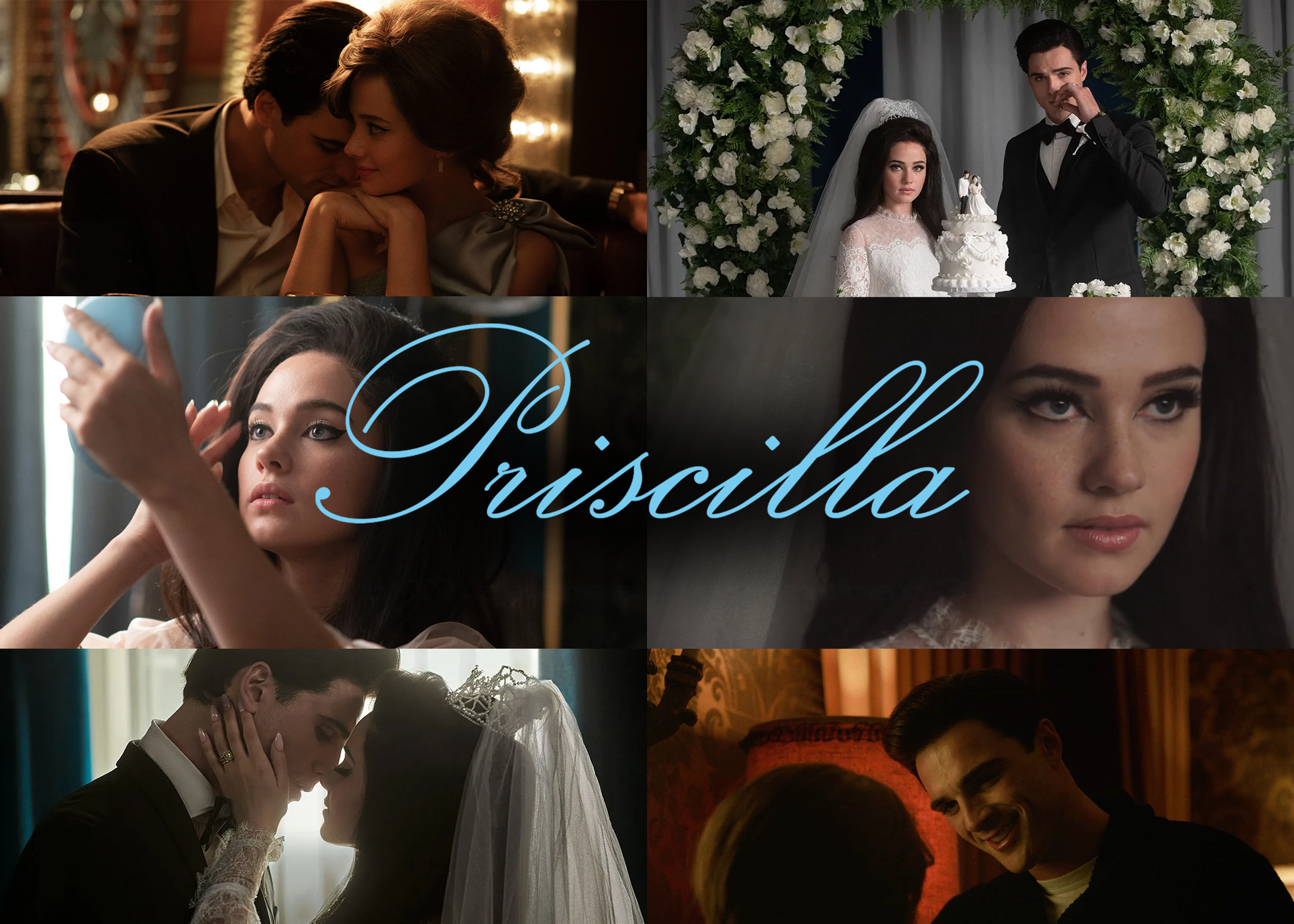Review | Sofia Coppola shows the colder side of Elvis’s burning love in ‘Priscilla’
“Priscilla,” directed by Sofia Coppola, tells the story of Priscilla Presley’s doomed relationship with rockstar Elvis Presley while being a moving tribute to girlhood and female freedom. Photo collage by SIMRAH AHMAD, Staff Photographer
Elvis may have taken his hit “Jailhouse Rock” a little too seriously.
“Priscilla,” the latest entry in writer/director Sofia Coppola’s impressive filmography (which includes “Lost in Translation,” “The Virgin Suicides” and “The Bling Ring”), is an adaptation of Priscilla Presley’s own memoir. It delves into the famous — or rather infamous — relationship between the ‘King of Rock and Roll’ and his lonely queen.
This story is a difficult one. It revolves around the grooming of 14-year-old Priscilla Beaulieu by 24-year-old Elvis Presley. In the hands of a lesser filmmaker, it could’ve easily been overdone and mishandled. Luckily, this is a Coppola film.
Coppola has mastered the art of ‘showing, not telling.’ She provides all the information the audience needs within a story, often without explicitly saying anything. Newcomer Cailee Spaeny delivers a wonderfully subtle and nuanced performance as the quiet and isolated Priscilla. Spaeny won Best Actress at the Venice Film Festival this past September for her performance, and she is sure to get buzz this upcoming awards season (assuming there is one, considering the strikes). Jacob Elordi, known for “Euphoria” and “The Kissing Booth” series, was also fantastic in the role of none other than Elvis himself.
Hot take incoming: Elordi out-Elvised Austin Butler. For one thing, he dropped the accent as soon as he walked off set. But on a more serious note, he was able to capture Elvis’s mannerisms seemingly effortlessly, and he perfectly reflected the darker sides of him that we don’t often hear about. Spaeny and Elordi had excellent chemistry, and each fully understood the character they were playing. They were able to balance the levity and childlike playfulness that existed between Priscilla and Elvis, while also getting across that the relationship was far from being one you should want for yourself. And you don’t have to take my word for it. Both Spaeny and Elordi managed to gain Priscilla’s approval.
The film looks gorgeous and is very well-written, which is no surprise, given the woman who was both behind the camera and holding the pen. Coppola’s style is very present in every frame and works perfectly for this story. The isolation of the beautiful spaces is almost tangible, and all the words, down to every punctuation mark, are written with intention. You get a whole view of not only the characters, but also the places they exist within, and you can see the emptiness behind the lavish decor.
Life at Graceland — Elvis’s famed house — was a different kind of solitary confinement than the one Elvis crooned about in what is possibly his most well-known song, but the young Priscilla certainly felt the same kind of trapped and alone during her time there. Coppola flawlessly captures the dreariness of what many would likely think of as a glamorous life, spending all your time with a rockstar and his friends. However, Priscilla had none of her own. Coppola draws attention to this several times and also highlights the ways in which Elvis treated her like a doll.
Coppola frequently highlights the age gap and power imbalance between the two, from the very apparent height difference between Spaeny and Elordi and the several times he calls her “Little Girl.” The film takes you through Priscilla’s adolescence and early adulthood, leading up to the act of freeing herself from Elvis. The audience is shown the loss of Priscilla’s girlhood to a deeply troubled (to say the least) older man and the claiming of her womanhood by herself. Watching her forge her own path and choose a life of freedom over her toxic relationship is a heartbreakingly beautiful thing.
Due to conflicts with Elvis’s estate, who still isn’t pleased with the film’s depiction of the musician-turned-actor-turned-musician-again, Coppola wasn’t allowed to use any of his music. She made the best of it, however, and I didn’t find it distracting. This is not his story, after all. If you’re desperate to hear all those songs, watch Baz Luhrmann’s “Elvis.” Speaking of the 2022 smash hit film, it is interesting that Elvis is portrayed as a tragic hero within it, while in “Priscilla,” he is certainly more of an antagonistic figure.
An interesting stylistic move is that each sequence ends with a fade out transition, which at first felt repetitive, but I soon realized it was part of Coppola’s genius. The transitions make the scenes feel like the chapters of a book. My one real note is that the ending felt a tad abrupt, but I still found it beautiful and deeply moving.
Priscilla herself has expressed her satisfaction with Coppola’s take on what is a very personal story to her. It was handled with care. Critics and casual film enjoyers alike are already expressing their praise for the film, and Coppola took home the Venice Film Festival’s Golden Lion award for Best Film. The lead actors are surely destined for great things in the near future, and, to quote Emperor Palpatine in “Star Wars: Episode I - The Phantom Menace,” I will be watching their careers with great interest.
“Priscilla” opened everywhere Nov. 3. Grab a friend, a ‘girl dinner’ and some tissues and make your way to the movies!


